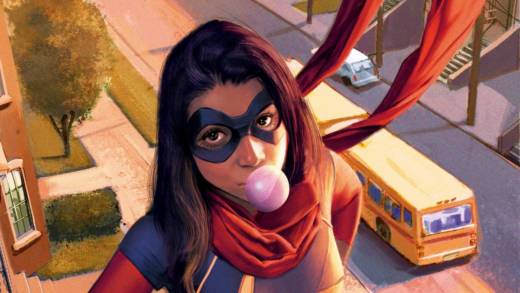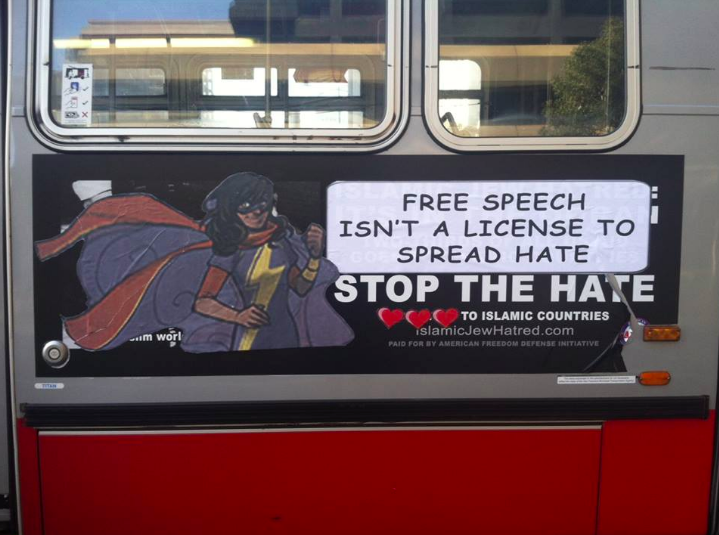It started with what seemed like a small announcement on Twitter.
Who is Ms. Marvel and Why Does Everyone Want to be in Her Movie?

Rogue One star—and one-half of the absurdly underrated Swet Shop Boys—Riz Ahmed jumped in, tagging Mindy Kaling and Big Sick writer/actor Kumail Nanjiani along the way.
"So when do @MarvelStudios want me @mindykaling @kumailn to get started on the MsMarvel screenplay?" he wrote on May 16, 2018.
Kaling was quick to respond, declaring:
Then The Good Place's Jameela Jamil chimed in too. "I can also do weekends!" she quipped.
Ahmed quickly replied that after being commissioned, they should just "hand the pen over" to Ms. Marvel creator Sana Amanat and Ms. Marvel writer, G. Willow Wilson. Amanat immediately responded by inviting Kaling to collaborate on a Ms. Marvel comic book:
So who is Ms. Marvel, and why do some of the most sought-after stars in Hollywood want in on this project?
If you haven't heard of Ms. Marvel before, it's probably because she's only existed for five years. In her everyday life, the shape-shifting, fast-healing superhero is Kamala Khan, a New Jersey-based Pakistani-American teen, who was inspired into action by her heroine, Captain Marvel. She is the first Muslim character in the Marvel universe to get her own comic book—and it was a bestseller to boot.
If you're a San Francisco resident already familiar with the character, it may have something to do with the anti-Muslim ads the American Freedom Defense Initiative put on buses in 2015. The posters were subsequently pasted over by protesters, using triumphant images of Ms. Marvel and pro-equality messages.

A Ms. Marvel movie would be incredibly significant, coming at a time when Hollywood is finally realizing that audiences want to see more films led by women and people of color. Not only did the phenomenal successes of Wonder Woman and Black Panther drive that point home, but we've only just recently arrived in a period where actors of South Asian descent aren't automatically expected to be accented caricatures. (Raj Koothrappali and Apu Nahasapeemapetilon remain on our televisions.)
Although E.R. broke ground between 2003 and 2009 with Neela Rasgotra (played by Parminder Nagra), the first major steps in changing the perception of what people of Indian and Pakistani descent had to look like in American pop culture really came courtesy of Mindy Kaling and Aziz Ansari.
Kaling's The Mindy Project (2012-2017) had mixed reviews, and Aziz Ansari's consent-related issues have since scuffed his image, but both Master of None and The Mindy Project broadened ideas about identity, culture, and integration, to a phenomenal degree. Both opened up the kind of space that allowed Jameela Jamil to join the cast of The Good Place as a wealthy British woman, steeped in class privilege, who just happened to have a name like Tahani Al-Jamil.
Assisting matters further, 2017's The Big Sick—Kumail Nanjiani's movie about the cultural challenges posed by his own relationship with a white woman—received critical praise and was nominated for a multitude of awards.
That same year, Hari Kondabolu issued a rallying cry with his documentary, The Problem With Apu. The film prompted major discussions in the U.S. around what is and isn't acceptable when it comes to South Asian representation in pop culture. It was a watershed moment that enabled the community to talk about the personal damage caused by tired old stereotyping, and the things they don't want to be asked to do on screen anymore. When The Simpsons refused to apologize for Apu (still voiced by a white man) and worked a tone-deaf response into the cartoon, the conversation only got larger.
If America was ever primed to see a young Muslim woman carving out space for herself next to an army of majority-white superheroes, it's now. A Ms. Marvel movie would be the perfect follow-up to Captain Marvel (arriving March 8, 2019, with Brie Larson in the starring role), and would keep the momentum going for women in superhero movies. (Let's not forget, we're still waiting for a stand alone Black Widow project.) To have stars of Mindy Kaling and Riz Ahmed's caliber involved would be a major boost to the project—but it's likely that Ms. Marvel would do just fine on her own.

